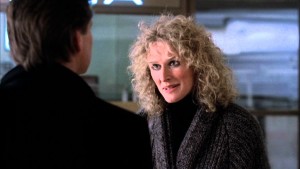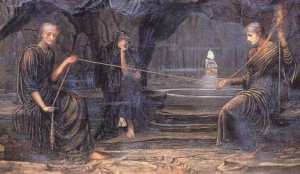A Capricious World
An aunt of mine was fond of saying “there is no justice in this world and probably none in the next”! As she was a minister’s wife, living in a vicarage, we may rightly conclude her tongue was somewhat in her cheek when she said this. The first part of her statement can appear true on occasion. There can seem to be so many injustices in this world of ours. Dictators can apparently commit crimes with impunity. Drug barons can become exceedingly wealthy. The great forces of Nature can wreak havoc equally on the virtuous and the unjust. It is only human to wonder “Does God care? And is God fair?”

We act and then it is up to Fate.
Michael Douglas committed a stupid indiscretion in the film Fatal Attraction. Having been briefly unfaithful to his wife, he and his family are pursued in a way that is truly scary. To be attracted to Alex Forest (Glen Close) in this story at least, is a fatal mistake. The Ancient Greeks would have understood Mr Douglas’s dilemma. To act in this way was indeed to put himself in the power of the Fates. In Greek Mythology there were three Fates, one who span, one who measured and one who cut life’s thread. If we are unlucky in love or in business, or if good fortune visits us, we may believe that it is just a matter of fate. Does this mean that our world is indeed capricious? Or is there a serious idea behind the myth of the Fates?

The Fates spin, measure and cut
If, as many believe, the world is indeed capricious, then my aunt’s first dictum is probably correct. There is much that we can see and indeed experience ourselves, where justice does not appear to have been done. At the time of the recent devastating tsunami, the news was full of reports about what a challenge this was to ‘people of Faith’. If acts of Nature are indeed arbitrary, then we would be right to question whether God is infinitely Good and Absolutely Just.
A Question of Perspective
If our perspective is limited to the tiny portion of space and time that we personally experience, then we may well question Divine Justice. Any event in time and space may appear unjust, for by definition we can only see it in part. Even the most elaborate computer that we might envision, cannot calculate all the possible causes of a given event, nor can compute all the possible outcomes until the end of the time. Yet, such a vision would be a necessary yardstick in order to judge Divine Justice.
If we conclude that we are “only bodies”, then the world in which we live does indeed look capricious. If we accept as a working hypothesis or if we know in the depths of our being, that we have a Soul, then our perspective can be entirely different. The Soul participates in time and space. However, the Soul is not limited to time and space. It is at this Soul level that we need to consider the question of Justice. If we reflect on the idea that the Soul has really been gifted with free will, then certain conclusions inevitably follow. For free will to mean anything, the Soul has to live with the consequences of its choices and its actions. If this was not the case, then free will would really have no meaning.
If we consider the individual at the level of their body, then they may appear subject to grave injustice. If we recognise that every individual is a Soul, then we can hold, at least as a working hypothesis, that the Soul has chosen its current experience. It is from this viewpoint that we may be able to conclude, that every experience a Soul receives is the most timely and perfect that can be imagined. For if this was not so then God’s Justice would be less than perfect. God would not be the Good. This would be a contradiction in terms.
Avoiding the Furies
When we act unconsciously, and unwisely, then of necessity we are subject to the unwelcome attention of the Fates. They then operate, according to ancient tradition, as the Furies. However, the same tradition suggests there is a way out of this dilemma. This is to act using the Soul powers that are sometimes called the Cardinal Virtues. Plato suggested there were three key virtues that had to be kept in balance. The first might be called simply ‘wisdom’. By this he meant being conscious and aware of what we do and using our best understanding. Our behaviour is then prudent rather than impulsive. The second is ‘courage’. It takes real fortitude to do what we know is right rather than what may be expedient. The third has been translated as ‘moderation’. If we are moderate, then we avoid the excesses of our emotional life. This does not mean we become coldly calculating but rather we warmly embrace life, avoiding extremes. With these three virtues operative we will, according to Plato, enjoyed the fourth virtue which is justice.
To live a virtuous life does not mean to emulate being uptight and Victorian in all that we do. It means to be fully human, because the word virtue has as its root (in Latin and Sanskrit) the word vir or ‘man’. In other words to be virtuous is to embrace our full humanity. In so doing, we leave behind the world of the Fates, and participate in the realm of Providence.
To live a life providentially is to “go with the flow”. However, the flow in this case is of divine origin rather than being merely worldly. For, to the degree that we can participate in Providence, we can recognise that there is both justice in this world as well as the next.
Originally published in ‘New Vision’, the magazine of the Hamblin Trust


Leave a Reply